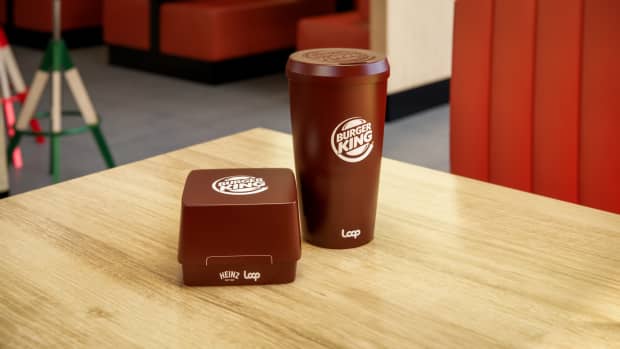This post was originally published on this site

Participating Burger King restaurants will feature a collection system, in which customers can return the packaging to be safely cleaned through Loop and reused.
Burger King
Burger King is testing reusable packaging, nudging customers to return these specialized Whopper boxes and soda and coffee cups for a wash and a repeat use.
The chain, part of Restaurant Brands International QSR, +1.36%, appears to be one of the first major fast food restaurants to establish this sustainable practice in the U.S. McDonalds MCD, +0.15% has plans for a reusable coffee cup in the U.K.
Burger King will launch the pilot program next year with TerraCycle’s zero-waste circular packaging service, Loop, whose product can be hygienically cleaned and reused for as long the as integrity of the packaging holds up.
Initial test cities are New York, Portland, Ore., and Tokyo, with more cities expected to be added in coming months. Loop officials have said previously that consumers should consider their projects reminiscent of the way households used to get milk – in reusable bottles.
“During COVID, we have seen the environmental impact of increased takeaway ordering, which makes this initiative by Burger King all the more important,” said Tom Szaky, TerraCycle and Loop CEO.
The announcement is the latest feature in Burger King’s pledge to source 100% of guest packaging from renewable, recycled or certified sources by 2025.
Takeout or eat-in diners who opt for the reusable packaging are charged a deposit at the time of purchase, and when the packaging is returned, they receive a refund.
“As part of our Restaurant Brands for Good plan, we’re investing in the development of sustainable packaging solutions that will help push the food service industry forward in reducing packaging waste,” said Matthew Banton, head of innovation and sustainability with Burger King Global. “The Loop system gives us the confidence in a reusable solution that meets our high safety standards, while also offering convenience for our guests on the go.”
In July, the fast food chain announced a version of its Whopper made from lemongrass-fed beef, which it said would cut methane emissions. The beef industry has been a major target of environmental advocates.
Read: Here’s how Burger King thinks it can cut cow emissions and still sell Whoppers
Another Restaurant Brands property, Tim Hortons, said this week it is ending the practice of double cupping hot drinks, a move it says will eliminate hundreds of millions of cups from landfills each year. The coffee and breakfast retailer will introduce early next year paper napkins that use 25% less material and are made up of 100% recycled fiber, which are estimated to save 900 metric tons of paper a year. And the chain is phasing out plastic straws from its 4,000 restaurants across Canada.

